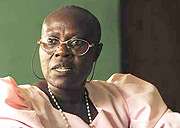Valérie Bemeriki
| Valérie Bemeriki | |
|---|---|
 | |
| Born |
1955 Rutshuru, Democratic Republic of Congo (then Belgian Congo)[1] |
| Nationality | Rwandan |
| Occupation | Radio presenter (animatrice), journalist |
| Criminal charge |
planning genocide, inciting violence, complicity in several murders (by a local Rwandan Gacaca court in 2009)[2] |
| Criminal penalty | Life imprisonment[2] |
| Criminal status | Incarcerated in Gikondo Prison (Kigali Central Prison, "1930"), Kigali,[3] Rwanda |
| Wikiquote has quotations related to: Valérie Bemeriki |
Valérie Bemeriki (born 1955[4] in Rutshuru, Democratic Republic of Congo[1]) was a presenter on the Rwandan radio station Radio Télévision Libre des Mille Collines (RTLM), which played a significant role in promoting the Rwandan Genocide.
Although born in Rutshuru, Democratic Republic of Congo (then Belgian Congo), Bemeriki's hometown is Giciye commune, Gisenyi préfecture, in Rwanda.[1] Prior to working at RTLM, Bemeriki worked for the ruling MRND party as a propagandist, also writing for the Interahamwe's (MRND's youth wing) publication.[5]
One of the main animatrices of RTLM,[2][6] Bemeriki frequently read out names and addresses of alleged "RPF accomplices",[7] inciting targeted violence and often murder on the named individuals by groups such as the Impuzamugambi and Interahamwe militias. Bemeriki's style of presenting was representative of RTLM's overall hateful rhetoric, used alongside a colloquial type of tongue-in-cheek humor. On April 8, 1994, two days after the assassination of Rwandan president Juvénal Habyarimana, Bemeriki ironically noted on air that opposition members of the previous government "could not be found",[8] while several, such as prime minister Agathe Uwilingiyimana had already been murdered. Based on an encounter at an interview at the offices of RTLM, Roméo Dallaire, the Force Commander of UNAMIR, has described Bemeriki as "very aggressive."[9] On June 28, 1994, over a month after the interview, Bemeriki claimed on-air that "Dallaire is the basis of this war."[10]
After Kantano Habimana, Bemeriki was the announcer with the second most airtime, approximately 17% of all RTLM broadcasts.[11]
Following the genocide, Bemeriki was named[6] as one its 2,133 "planners, organizers, instigators, supervisors and leaders"[12] in accordance with the Genocide Law of the Republic of Rwanda (1996).[13]
Bemeriki fled Kigali for her native Zaire in July 1994 [1] and was arrested in Minova, near Bukavu in the (by then renamed) Democratic Republic of Congo on the 13th of June, 1999 by the Rwandan military.[1][4] [6] She was convicted of and pleaded guilty to planning genocide, inciting violence and complicity in several murders and sentenced to life imprisonment by a Gacaca court in 2009.[2][4]
References
- 1 2 3 4 5 "VALERIE BEMERIKI, ANCIENNE JOURNALISTE DE RTLM ARRETEE, RECONNAÎT LES FAITS QUI LUI SONT REPROCHES". Hirondelle. Kigali, Rwanda. 22 June 1999.
|first1=missing|last1=in Authors list (help) - 1 2 3 4 "Rwanda jails journalist Valerie Bemeriki for genocide". BBC. London, UK. 14 December 2009.
- ↑ Brunner, Kira (2003). The New Killing Fields: Massacre and the Politics of Intervention. Basic Books. p. 119. ISBN 0465008046.
- 1 2 3 "Valerie Bemeriki". TRIAL (Swiss association against impunity).
- ↑ Legatt-Smith, Yvonne (1995). Rwanda: Not So Innocent - When Women Become Killers. African Rights. p. 80. ISBN 1899477055.
- 1 2 3 http://www.pulitzer.org/archives/6922 Olojede, Dele (4 May 2004). "When Words Could Kill". Newsday. New York City, NY, USA.
- ↑ Cotton, Cassandra (2007). "'Where Radio is King:' Rwanda's Hate Radio and the Lessons Learned.". Atlantic International Studies Journal: 4–11. Retrieved 17 March 2013.
- ↑ Melvern, Linda (2006). Conspiracy to Murder: The Rwandan Genocide. London, UK: Verso Books. p. 175. ISBN 1844675424.
- ↑ Dallaire, Roméo (2003). Shake Hands with the Devil. The Failure of Humanity in Rwanda. Random House Canada. p. 349. ISBN 978-0-679-31171-3.
- ↑ UN transcript; ICTR-99-52-T; June 28, 1994, P137B, pg.17
- ↑ Thompson, Allan (Ed.) (2007). Kimani, Mary: RTLM: the Medium that Became a Tool for Mass Murder. In "The Media and the Rwanda Genocide". Pluto Press, Fountain Publishers, IDRC. p. 116. ISBN 0-74532-625-0. Retrieved 19 March 2013.
- ↑ http://www.rwandaembassy.org/discover-rwanda/the-genocide-in-rwanda.html The Genocide in Rwanda: Rwanda Embassy, Washington, D.C., 08. January 2011
- ↑ http://www.unhcr.org/refworld/topic,463af2212,469f2d0c2,3df4bea428,0,,,.html Immigration and Refugee Board of Canada, Rwanda: Whether there is a "list" kept by the government of Hutus wanted in connection with the genocide (...) [accessed 17 March 2013]
